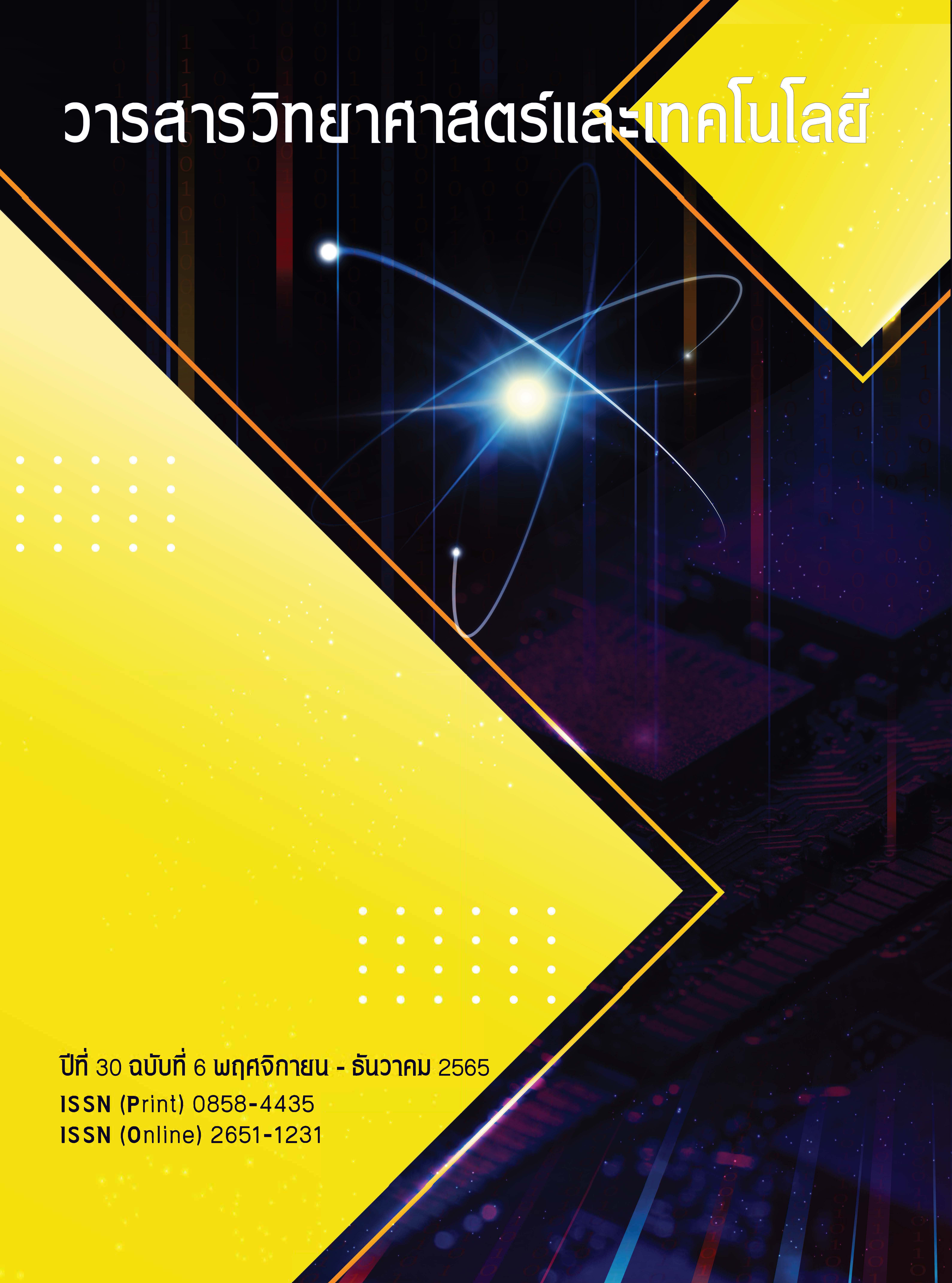Utilization of Waste from Biomass for Fuel Briquettes Production
Main Article Content
Abstract
A cube compression of biowaste supports the disposal of biomass residues and enhancement of combustion efficiency and fuel storage. This research investigated the utilization of waste from biowastes for fuel briquettes production. It was to study the chemical and physical properties of fuel briquettes from biowastes, the optimal ratios of biomass, and the efficiency of fuel briquettes from biowastes compared with the standard of Thai community product standard (TCPs) 238/2547. Biowastes materials used to produce fuel briquettes are sewage sludge, agricultural wastes mixed with cassava starch sediment as a binder at the ratios of 0.35:0.40:0.25 and 0.65:0.15:0.20 kg:kg:kg, respectively. They were compressed by a cold-pressed process. Then, they were studied the chemical properties of heating values, moisture content, ash content, and physical properties of density, drop shatter test, including the examination of well-forming briquettes. Results showed that the ratio of sewage sludge, coconut shell, and cassava starch sediment at 0.35:0.40:0.25 was an effective fuel briquette with the chemical properties of heating value at 5,158.09 cal/g (21,586 KJ/Kg), moisture and ash content of 4%, 8.17% w/w, respectively, the physical properties of density of 0.91 g/cm3, and drop shatter of 0.95. Moreover, the results of fuel briquettes during combustion showed an ignition distance of 35 minutes, a smoke duration of 47 minutes, and a lower quantity that is according to the TCPs 238/2547. Hence, this research study can be applied as a guideline for biowastes utilization in the production of fuel briquettes for using alternative energy sources in the community.
Article Details
References
Ruchuwararak, P., Kerdsuk, W., Sarawadee, D., Chantaramas, W. and Kerdsuk, W.,2013, A ResultofRenewable Energy for Cooking in The Household, Academic Journal of Humanities and Social sciencesBuriram Rajabhat University. 2: 46-59. (in Thai)
Peamsuwan R and Deeto S., 2021, The Production and Properties of Fuel Briquettes from Animal and Agricultural Bio-waste to Renewable Energy Source in Rural Community. Journal of Renewable Energy and Smart Grid Technology.2: 56-67.
Sukaranandana K and Tanpaiboolkul N., 2019, Utilizationof CassavaResiduefrom Agro-Industry as Binder with Powder of Palmyra Palm fruit Peel Charcoal for Briquettes Fuel Production. E-Journal, Science and Technology Silpakorn University. 6: 48-65. (in Thai)
Thepsaskul W., Thammachat W., Intaniwet A., 2016, Investigation of coconut shell carbonization fuel briquettes fabrication, 12th Conference on Energy Network of Thailand, pp.610 – 618. (in Thai)
Kumpapai, C., Boonthanom, N., Rodjananon, T. and Wongthanate, J., 2020, The Efficiency Comparison of Fuel Briquettes from Agricultural Wastes. The Journal of Industrial Technology. 3:28-38. (in Thai)
AmericanSociety forTesting and Materials (ASTM).2015.Standard Test Methods for Gross CalorificValueof Coaland Coke by the Isoperibol Bomb Calorimeter: D3286-96In ASTM. AnnualBookof AmericanStandard Testing Methods,Vol05.06.
AmericanSociety forTesting and Materials (ASTM).1996.Standard Test Methods for Proximate Analysis of Coal and Coke by Macro Thermogravimetric Analysis : D7582-15In ASTM. AnnualBookof AmericanStandard Testing Methods,Vol05.06.
AmericanSociety forTesting and Materials (ASTM).1993.Standard Test Methods for Drop ShatterTest for Coke: D3038-93 In ASTM. AnnualBookof AmericanStandard Testing Methods, Vol 05.06.
Anantanukulwong, R., Chemae, R., Sareanu, N., 2019, Production of Charcoal from Agricultural Waste Residues, YRU Journal of Science and Technology. 1:47-53. (in Thai)
Thepha,S.and MongkhamklangS.,2019, Study of Briquette Production from Coconut Shell Mixed Sugarcane bagasse and Pandanus Leaves. Journal of Industrial Technology. 2: 16-20. (in Thai)
Sangkhaphan A., 2017, Co-Pelletized Briquettes Production from Municipal Wastewater Sludge; Case Study of Pattaya Municipal wastewater treatment plant. Local and Global Sustainability: Meeting the Challenges and Sharing the Solution,9th Nationnaland International Conference, pp.1523 – 1533. (in Thai)
Thai Industrial Standards Institute (TISI), Ministry of Industry. Thai Community Product Standards Charcoal Bar TCPS number 238/2547, 2004. (in Thai)
Saha,K., Hossain, M., Ali,R.and Alam, M., 2014, Feasibility Study of Coconut Coir DustBriquette. Journalof theBangladesh Agricultural University. 2: 369-376.
Sunthararak, S., Makmon, D. and Wongmalee W., 2018, The Development of CharcoalFuelBriquettes from Eucalyptus leaves And Brasiliensis leaves,2nd National and International Research Conference, pp.339-348. (in Thai)
Photong N and Wongthanate J., 2019, Biofuel Production from Bio-Waste by Biological and Physical Conversion Processes. Journalof Waste Management and Research. 1:1-9.


